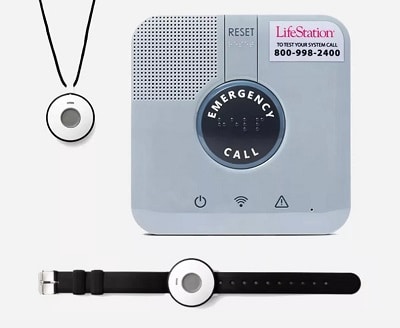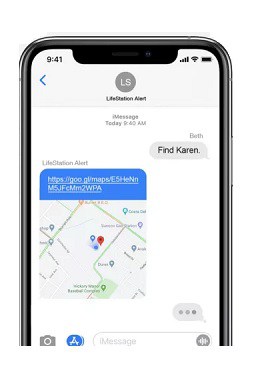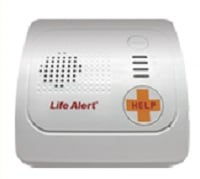Last Updated on August 11, 2021
| LifeStation | Life Alert | |
|---|---|---|
| In-home Landline System | Yes | Yes |
| In-home Cellular (No Landline Needed) System | Yes | Yes |
| Mobile GPS System | Yes | Yes |
| In-Home Range | Up to 500 ft | Up to 800 ft |
| On-the-go Range | Works wherever AT&T cellular signals allows. | Works wherever AT&T cellular signals allows. |
| In-Home Button Battery Life | Up to 4 years | Up to 10 years |
| Mobile Button Battery Life | Up to 5 days | Up to 10 years |
| Fall Detection | Yes for both in-home and on-the-go systems | No |
| Monitoring Center Standards | UL Listed & TMA Five-Diamond | UL Listed & TMA Five-Diamond |
| Cost | $22.95 to $47.95/ mo | $49.95 to $89.95/ mo |
| Start-Up Fees | $10 activation, else none for most plans | $95 to $198 |
| Minimum Term Required | Month-to-month | 3 years |
| Caregiver Tools/ Apps | Caregiver Alerts and Text-to-Locate for family, caregivers | Mobile App to contact emergency center |
| Toll-Free Number (Click to Call) | 1-866-260-2696 | |
| Full Review | LifeStation Review | Life Alert Review |
| Website | LifeStation Website | Life Alert Website |
LifeStation and Life Alert are both top tier medical alert companies in the market today. They help seniors live independently by providing them with easy access to help in case of emergencies. Both companies offer similar medical alert products that allow customers to call for help with the press of an emergency alert button. As our parents or we get older, we tend to be more concerned about health and safety issues. Medical alert products offer peace of mind for both the customer using the system and their families.
 Click to Call LifeStation 1-866-260-2696
Click to Call LifeStation 1-866-260-2696Both LifeStation and Life Alert have been in business for decades and with lots of good testimonials from customers. If you are looking for a suitable system for yourself or your parents, this comparison review has a lot of insightful information to help you decide. In a hurry? Skip to our summary section for our recommendation.
LifeStation vs. Life Alert Fundamentals
There are fundamental similarities in the services offered by Life Alert and LifeStation.
- The primary objective of both companies is to keep seniors safe and provide for fast assistance in the case of an emergency.
- Both companies offer a medical alert necklace or wristband that is paired with a base unit installed at home. This set-set-up creates a channel for two-way communication.
- They both offer systems that work through a home landline, home cellular (no home phone line needed) connection, and a mobile GPS button option.
- Both are US-based companies that run their in-house monitoring centers to high industry standards (UL Listed and TMA Five-Diamond).
- LifeStation and Life Alert both offer accessories like extra in-home pendants and wall buttons. LifeStation also allows customers to rent a key lockbox from them.

Life Alert vs. LifeStation Differences
LifeStation and Life Alert are helping seniors live independently at home through very similar medical alert products. When you compare more closely, several differences set the two service providers apart.
Contracts
LifeStation does not require any long-term contracts while Life Alert requires a 36-month contract to use their service. When reading through Life Alert complaints on the BBB, we found numerous instances where customers had problems canceling their service before their 36-month term ended. Life Alert was a target of a New York Attorney General’s office investigation and censure.
At first glance, signing into a multi-year contract may seem natural if you are planning to keep the service ongoing. However, this topic has generated a lot of grievances for customers.
The industry standard has already shifted to not having long-term contracts. Unless you do not mind spending time and nerves managing the purchase, this is something to seriously think over. Let Life Alert’s Attorney General investigation and findings serve as an alert to compare and choose carefully.
LifeStation allows customers to cancel anytime without cancellation fees. Besides, they also offer a 30-day money-back guarantee (with qualifications). If you are interested in their service and have questions, please contact LifeStation directly at 1-866-260-2696. They can provide information on their best offers to suit your needs.
Fall Detection
With fall detection, once a fall has been detected, the fall detection mechanism will automatically place an alarm call to a monitoring center. Customers of LifeStation have the opportunity to upgrade their in-home, landline, or cellular systems to include fall detection. In comparison, Life Alert does not offer this optional feature to their customers.
Fall detection can be a helpful add-on for customers who are at risk of falling and losing their orientation or consciousness. Without fall detection, customers can still push their emergency SOS button to signal that they need help.
Monitoring Service
Both companies operate their certified 24/7 medical alert monitoring service in-house. Both companies also offer monitoring centers that meet coveted industry UL listing and TMA Five Diamond standards.
What’s note-worthy is that LifeStation’s service is based on two geographically distant, duplicated and redundant monitoring centers (in Texas and New Jersey). If something happens at one location, regular service will continue on without interruption.
Life Alert’s main monitoring center is located in Encino, California. Unfortunately, we are unable to ascertain their backup monitoring service options after speaking with their representatives and researching.
Battery Life
All Life Alert buttons have long battery lives that span up to 7 to 10 years, whether for their in-home or mobile GPS systems. Unlike a cell phone that requires regular charging, Life Alert’s buttons do not need charging every couple of days. That makes it very easy for elderly customers to use their Life Alert systems.
For LifeStation, their in-home system buttons will last up to a good 4 years or longer, and thus do not need regular charging. In contrast, their mobile GPS button pendant lasts up to 5 days on a full charge. Senior customers using LifeStation’s mobile GPS buttons will need to recharge them regularly.
Caregiver Alerts
While the two service providers share a lot of standard features, a notable difference is the type of caregiver tools that LifeStation offers. All LifeStation systems come with their Caregiver Alert service. In contrast, Life Alert does not provide similar information-sharing features for their customers.
LifeStation’s Caregiver Alert service will send out email or text alerts to their senior customer’s family and caregivers whenever their customer pushes on their button. This feature provides children and caregivers with an additional avenue of knowing if their loved one or patient needs help. This feature does not replace the standard procedure to telephone emergency contacts if the situation calls for it.
Text-to-Locate

In addition, family members and caregivers can send a text to locate their loved ones. This works through LifeStation’s mobile GPS medical alert device. GPS location information from the devices can be retrieved through texting. This is a useful service that comes free with all LifeStation GPS mobile device subscriptions, basic or premium.
Unfortunately, Life Alert is less savvy when it comes to these technologically more advanced add-on services. At one point, they developed and offered a mobile app that connected subscribers to their monitoring center. This is no longer available.
Range – In-Home & Mobile
If you are using the home-based device, LifeStation has a maximum range of about 500 feet from the base unit while Life Alert’s in-home unit offers a range of 800 feet. While a more extended range may appear like a good thing, in the context of an in-home system, it may not represent a meaningful difference.
With an in-home system, if you are too far from the base station, you will be out of voice range. Help will be sent to the home address regardless of how far away you are when you push the button. Most people who are looking for a long-range system want one that is mobile, with a speakerphone on it, and able to work from anywhere.
Fortunately, companies offer mobile medical alert systems with GPS. Mobile medical alert devices are akin to miniature cell phones. They will connect to a monitoring center through cellular network signals. Life Alert and LifeStation’s mobile alert pendants both use AT&T’s cellular network.
Installation
When it comes to the installation of the equipment, Life Alert oftentimes provides in-person professional assistance to get their products installed. While that makes it a more hands-off process, Life Alert customers typically end up paying for professional installation to get started.
LifeStation, in contrast, allows users themselves to self-install their systems. It’s a simple and free process to get set-up, and customers can always call LifeStation for guidance if needed.
Cost
Life Alert’s least costly package starts at $49.95 per month for in-home coverage, but they typically want new customers to purchase their in-home and mobile GPS combo package that cost up $69.90 and higher. Life Alert also charges $95 to $198 in start-up fees for their systems. Check out our Life Alert Cost Comparison article for more pricing comparisons.
In comparison, LifeStation’s pricing is lower at $22.95 per month for their in-home landline package. Their mobile GPS system starts at $37.95 per month.
There are also no fees to get started with all LifeStation plan, except for their base level mobile GPS system package. The $37.95/mo requires a $10 activation fee. LifeStation offers good periodic specials on the phone to new prospective customers who are readers of this website. If you are interested, please contact LifeStation directly at 1-866-260-2696 to discuss pricing and term options (use coupon code MASHQ).
In Summary
Both LifeStation and Life Alert provide products and services that have their own set of advantages and disadvantages. In addition to a standard medical alert package, LifeStation provides Caregiver alerts and Find My Loved One location sharing to help relatives and caregivers. Life Alert is more costly and requires a 3-year commitment, while the LifeStation is less expensive and allows customers to cancel anytime.
Overall, we recommend LifeStation as they provide quality monitoring and products just like Life Alert; yet they do not tie customers to long-term contracts, they provide caregiver alerts, and their pricing is cost-effective. You can check out our full detailed reviews of LifeStation and Life Alert. Take time to compare the strengths and weaknesses of each company and how they can help you or your parents.
 Click to Call LifeStation 1-866-260-2696
Click to Call LifeStation 1-866-260-2696Disclosure: We receive referrals commissions for purchases made (details).
For an overview of alternative Life Alert systems, check out our our guide here.
Check out our main Reviews section for reviews on other top medical alert companies. For more Life Alert comparisons, check out our Medical Guardian vs. Life Alert comparison.
While every effort has been made to ensure the accuracy of the information contained in this review, the information is supplied without warranties of any kind. We advise all readers to do careful due diligence before purchasing. Take time to visit the company’s website and speak with their representatives.
- Bay Alarm Medical In-Home Cellular Response Speed 46% Faster in 2023 - July 5, 2023
- Medical Alert Systems For Landlines - November 20, 2022
- The Truth About Long-Range Medical Alert Systems - May 1, 2022


